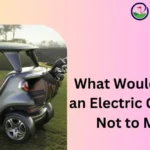Electric carts produce zero emissions, require less maintenance, and are quieter, but have limited range and charging infrastructure. When choosing between gas and electric golf carts, it’s important to weigh the pros and cons to determine the best fit for your needs.
Both options have their advantages and limitations, so understanding these differences is crucial in making an informed decision.
We’ll explore the pros and cons of gas versus electric golf carts to help you evaluate which option aligns with your preferences and practical requirements. However, do you know Power-Packed Pros And Cons of Gas Vs. Electric Golf Carts.
Whether you prioritize power and range or sustainability and low maintenance, this comparison will provide valuable insights for choosing the right golf cart for your specific use case.
Cost Efficiency
When considering the cost efficiency of gas and electric golf carts, it’s essential to evaluate both the initial purchase cost and the operating expenses over the cart’s lifetime. Let’s analyze the advantages and drawbacks of each option.
Initial Purchase Cost
- Lower initial cost
- Typically more affordable than electric models
- Higher initial investment
- Often pricier than gasoline-powered counterparts
Operating Cost Comparison
| Expense | Gas Golf Cart | Electric Golf Cart |
|---|---|---|
| Fuel Costs | Dependent on fluctuating gas prices | Relatively lower as electricity rates remain more stable |
| Maintenance | May require more frequent and costly maintenance | Less maintenance due to fewer moving parts |
| Long-term Expenses | Higher due to fuel and maintenance | Lower due to reduced energy and maintenance costs |
Environmental Impact
Emissions And Pollution
Gas golf carts produce emissions, including carbon monoxide, hydrocarbons, and nitrogen oxides, which contribute to air pollution and can have harmful effects on human health.
Electric golf carts, on the other hand, produce zero tailpipe emissions, making them a cleaner and more environmentally friendly option.
Eco-friendliness
Gas golf carts are less eco-friendly due to their emissions and dependence on fossil fuels, which contribute to environmental degradation and climate change.
Electric golf carts, powered by rechargeable batteries, have a significantly lower environmental impact, as they do not release harmful pollutants into the atmosphere during operation.
Performance And Power
When comparing gas and electric golf carts, the performance and power play a crucial role in determining their effectiveness on the course. Let’s delve into how each type excels in terms of speed, acceleration, and hill-climbing abilities.
Speed And Acceleration
Gas golf carts typically have higher top speeds compared to their electric counterparts, ideal for covering large distances quickly.
Electric golf carts, on the other hand, offer quick acceleration from a standstill, making them efficient in stop-and-go situations on the course.
Hill Climbing Abilities
Gas golf carts have more power and torque, enabling them to tackle steep inclines with ease, providing a smoother ride on hilly terrains.
Electric golf carts, although generally less powerful, excel in maintaining consistent performance when climbing hills, thanks to their steady torque delivery.
Maintenance And Upkeep
When considering gas versus electric golf carts, it’s important to weigh the pros and cons. Gas-powered carts offer more power and longer range, but require more maintenance.
On the other hand, electric carts are low-maintenance, environmentally friendly, and quieter, but may have limited range and power.
Maintenance and Upkeep When it comes to owning a golf cart, one important aspect to consider is maintenance and upkeep.
Both gas-powered and electric golf carts have their pros and cons when it comes to routine maintenance needs and long-term durability. In this section, we will explore these factors in detail to help you make an informed decision for your golf cart.
Routine Maintenance Needs
Maintaining a golf cart is essential for its safe and efficient operation. In terms of routine maintenance needs, there are a few key differences between gas and electric golf carts. For gas-powered golf carts, regular maintenance includes tasks such as oil changes, air filter replacement, and spark plug inspection.
Additionally, the fuel system needs attention, including checking for leaks and ensuring the correct fuel mix. These routine tasks can be a bit time-consuming and may require some basic mechanical knowledge. On the other hand, electric golf carts have fewer maintenance needs.
With no engine oil, fuel filters, or spark plugs to worry about, routine maintenance is relatively simpler and less frequent.
The main maintenance tasks for electric golf carts typically include battery maintenance, such as checking and watering the batteries, and keeping the battery terminals clean. Additionally, periodic inspections of the wiring system and motor brushes are recommended to ensure optimal performance.
Long-term Durability
When it comes to long-term durability, gas and electric golf carts also vary in their performance and lifespan. Gas-powered golf carts are generally known for their robust construction and ability to handle tough terrains. Their powerful engines provide excellent torque, making them suitable for off-road adventures.
However, the internal combustion engine is subject to wear and tear, which may require repairs or replacements over time. Regular engine maintenance and occasional engine rebuilds are not uncommon for gas-powered golf carts. On the other hand, electric golf carts, although not as powerful as their gas counterparts, are known for their simplicity and longevity.
With fewer moving parts and no combustion engine, electric golf carts tend to require fewer repairs and have a longer lifespan.
The main components that may need replacement over time are the batteries. But with proper care and maintenance, such as regular charging and avoiding deep discharges, the battery life can be extended, leading to many years of reliable usage.
In conclusion, routine maintenance needs and long-term durability are key factors to consider when choosing between gas and electric golf carts.
While gas-powered golf carts require more regular maintenance and may need engine repairs, electric golf carts have fewer maintenance needs, primarily revolving around battery care.
Both carry their own advantages and considerations, depending on your preferences and usage requirements.
Convenience And Charging
When it comes to golf carts, convenience and charging are two key factors to consider. In this section, we will explore the pros and cons of gas and electric golf carts when it comes to the convenience of charging.
Charging Time And Access
One of the biggest advantages of gas-powered golf carts is the quick and easy refueling process. Unlike electric golf carts that require charging, gas carts can simply be fueled up within a few minutes. This means you don’t have to worry about waiting for your golf cart to charge before hitting the course.
| Pros: | Cons: |
|
|
On the other hand, electric golf carts require charging and have longer charging times compared to refueling gas carts. Depending on the battery type, it can take several hours to fully charge an electric golf cart.
Additionally, finding charging stations might not be as convenient as finding a gas station, especially in remote areas or on some golf courses.
Range And Battery Life
When it comes to range and battery life, electric golf carts have the upper hand. They can travel longer distances on a single charge compared to gas-powered carts. This can be particularly beneficial on larger golf courses or for extended use.
Electric carts also have a longer overall battery life, with batteries lasting several years before needing replacement.
| Pros: | Cons: |
|
|
In conclusion, when considering convenience and charging, gas-powered golf carts offer quick refueling and less downtime.
However, electric golf carts have the advantages of longer driving range and battery life. Ultimately, the decision between gas and electric will depend on your specific needs and preferences as a golfer.
Regulations And Restrictions
Regulations and restrictions play a significant role when considering whether to opt for gas or electric golf carts. Understanding the rules and laws governing the use of these carts is crucial to ensuring a seamless experience on the golf course.
Golf Course Rules
Golf courses typically have specific regulations in place dictating the type of golf carts allowed on their premises. Some courses may only permit electric carts due to noise and environmental concerns.
Local Laws And Compliance
Local laws and compliance requirements vary from one area to another. It’s essential to be aware of any regulations regarding the use of gas or electric golf carts in your region for a hassle-free experience.
Frequently Asked Questions On Pros And Cons Of Gas Vs. Electric Golf Carts
Are Gas Golf Carts More Powerful Than Electric Ones?
Gas golf carts tend to have more power, making them ideal for hilly terrains or carrying heavier loads.
Are Electric Golf Carts More Environmentally Friendly Than Gas Ones?
Yes, electric golf carts produce zero emissions, making them a greener choice for the environment. Power-Packed Pros And Cons of Gas Vs. Electric Golf Carts
Which Type Of Golf Cart Is More Cost-effective In The Long Run?
Electric golf carts generally have lower maintenance and operating costs, making them more cost-effective in the long run.
How Far Can An Electric Golf Cart Travel On A Single Charge?
The range of an electric golf cart can vary, but on average, they can travel around 25-30 miles on a single charge.
Can Gas Golf Carts Be Easily Refueled Compared To Electric Ones?
Refueling gas golf carts is more convenient as there are numerous gas stations available, while electric carts require recharging stations.
Conclusion
After weighing the pros and cons of gas and electric golf carts, it’s evident that each has its own advantages. It ultimately comes down to personal preference and specific needs. Whether you prioritize power and range or eco-friendliness and maintenance costs, both options offer unique benefits for golf cart users.












